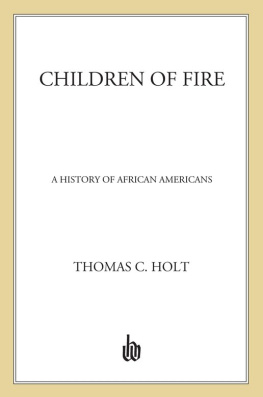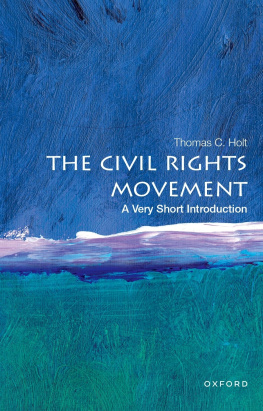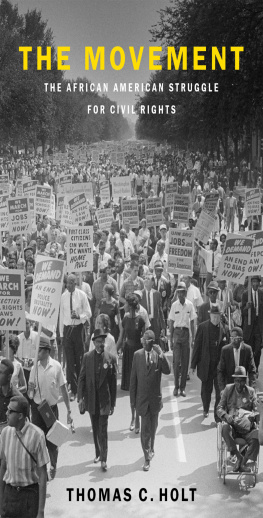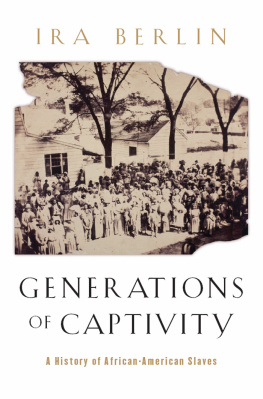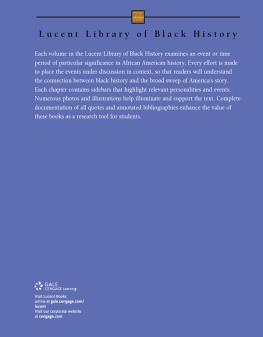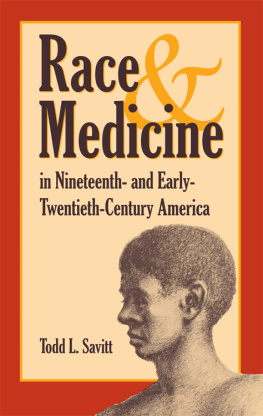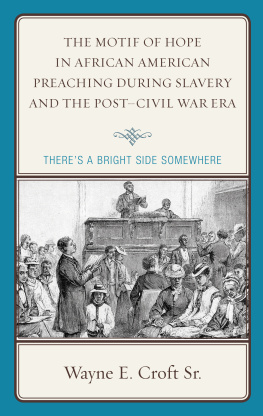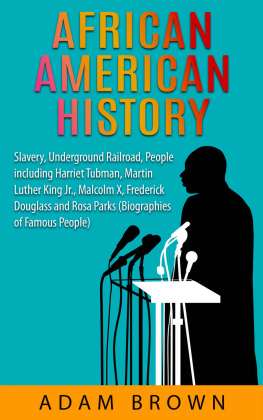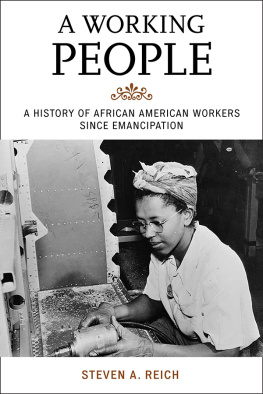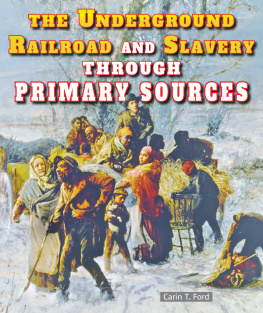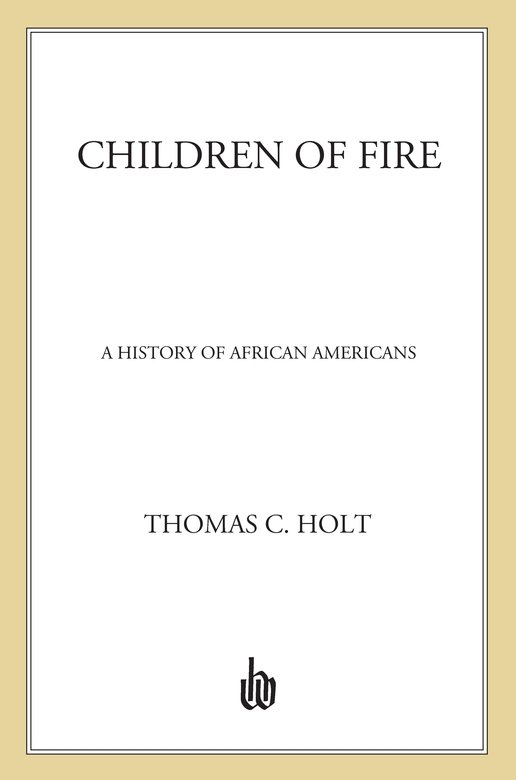Undertaking a project of this scope and duration means that one necessarily incurs an immense debt to friends and strangers, to persons and institutions that one can probably never fully repay. Hopefully the book itself will be accepted as a small installment. As with most debts, the most recent generally loom larger in ones memory than the earliest. The gracious efficiency of staff at various archives and libraries has greatly eased the final preparations of this book, especially as I sought to locate and secure permission to publish illustrations. I am grateful to Kenneth Johnson in the photoduplication department at the Library of Congress and to Glenn Humphries in Special Collections at the Chicago Public Library. Fellow historians Christopher R. Reed, emeritus professor at Roosevelt University, and Ted Rosengarten at South Carolina have been extraordinarily generous with their time and resources, loaning me images out of their personal files. Similarly, during these hectic final weeks, I have benefited enormously from the generosity of Chris Winters, of the University of Chicago Librarys Map Collection, and Dale Mertes, of the universitys Digital Laboratory. Chris guided me through the intricacies of ArcGIS map production, and Dale refined and polished my crude results for publication. Their respective interventions came at a moment of despair upon finding that suitable historical maps simply didnt exist.
First among my longtime creditors are my many students, present and past, undergraduate and graduate, including those now well launched on careers of their own. The ideas and formulations in this book were first tested in graduate and undergraduate classes at the University of Chicago. After that came the task of searching out and marshaling the sources that documented those intellectual formulations and insightsall of whichwould have taken a lot longer had I not enjoyed the assistance of numerous wonderful student researchers over the past decade. Among them was Jon White, a University of Maryland student recommended to me by Ira Berlin; I had never met Jon, but he undertook for me a timely preliminary search of the military service and pension files at the National Archives. Among those I know very well, there are no doubt some who will be surprised to see their names listed here, since in some cases their labors predated the inception of this particular book project. Nonetheless, A. J. Aisirithe, Elizabeth Dale, Steve Essig, Laurie Green, and Hannah Rosen all did some of the crucial preliminary research that made taking on this project seem plausible. In a few cases the influence that their subsequent intellectual labors have had on me are evident in the endnotes of this volume.
My intellectual debt to Molly Hudgens and Elizabeth Wood will not be found in those endnotes, but the extraordinary research skills and diligence of each of them have greatly enriched this text. Indeed, there are paths I might not have explored to the depths that I did without Mollys persistence and nose for sources, and it is impossible to imagine what bringing this project to a close would have been like without the absolute determination and reliability of Betsy Wood chasing down every last footnote and source.
Friends and colleagues have sustained me in this work throughout. As usual, my first reader was Leora Auslander, whose interventions emerged not only from reading various drafts as they flew off the printer but in long, sometimes tangential conversations that subtly shaped my prose as well as my thinking. Rebecca Scott has been a friend and intellectual comrade for more years than either of us wishes to count, and she never fails to be equally generous with her time and astute in her commentary. Ira Berlin, Fred Cooper, Laurent Dubois, Jim Grossman, William McFeely, Julie Saville, Frank Mickey Schubert, Mark Schultz, Jim Sparrow, J. Mills Thornton, Nan Woodruff, and Jean-Claude Zancarini have all generously taken time to read one or more of these chapters. Their expertise has not only saved me from many errors of fact and judgment but provided encouragement that my efforts were worthwhile. Needless to say, I alone am responsible for any errors or infelicities that remain. Or almost alone. Dan Crissman, my editor at Hill and Wang, and Jenna Dolan, my books copy editor, have admirably formed the final line of defense against error and awkwardness.
Like the army, book writers travel on their stomachs. This book, too, owes its existence to the institutions that enabled its author to keep body and soul together long enough to finish it. The MacArthur Foundation enabled me to take a number of research leaves that facilitated the early stages of my research. The University of Chicago has been generous in its leave policy at crucial moments in this project, for which I thank my former and current deans, Richard Saller and Mark Hansen, respectively, and my former and current department chairs, Kathy Conzen, Prasenjit Duara, and Bruce Cummings. I stole time from a National Endowment for the Humanities fellowship intended to support a study of race-mixture to finish this history. I trust that repayment in a somewhat foreign coin is at least partially acceptable. In any event, I am confident that my deferred study of the broader problem of race in the modern world will benefit from this one having been written first. I must offer a similar I.O.U. to the American Academy in Berlin, which provided intellectual company and financial support during the critical final year of writing. Another institution that is no doubt oblivious to the support it has given this project is the John F. Kennedy Bibliotek of the Freie Universitt in Berlin. During extended stays in that wonderful city, the open stack access to English-language resources that the FU has provided me has been an intellectual lifeline.
Finally, I have taken the unusual step of dedicating this book to three people, each of whom has been instrumental in its conception. The late John Hope Franklin was an inspiration and unofficial mentor to me, as he was to generations of students of the African American experience. Some years ago I read a paper celebrating the fiftieth anniversary of his influential historical survey of that experience. In the process I was reintroduced to the power of the first (1947) edition of that text and drawn to its singular vision, at once politically committed and intellectually honest. Few history texts, before or since, have equaled it, but it is a model to which his successors can aspire. Many years ago, I was privileged to hear his eloquent summation of the citizen-scholars creed, and flatter myself that this effort is at least partly indebted to it: If one believes in the power of his own words and in the words of others, one must also hope and believe that the world will be a better place by our having spoken or written those words.
I have also dedicated this book to the memory of my late father. Something of the reason for that acknowledgment is discussed in the preface.Certainly reflections on my fathers life have stimulated and shaped both the intellectual content and the sensibilities of this work.
Finally, I dedicate this book to my wife, Leora Auslander. After sharing more than twenty years of both triumph and heartbreak, it seemed about time. But, of course, it is much more than that. From the first, ours has been an intellectual as well as an emotional bond. This dedication acknowledges to the world how much that bond has energized and sustained me. In my darkest moments of self-doubt, it has been my fire.
Thomas C. Holt
Chicago
Black over White: Negro Political Leadership in South Carolina During Reconstruction

